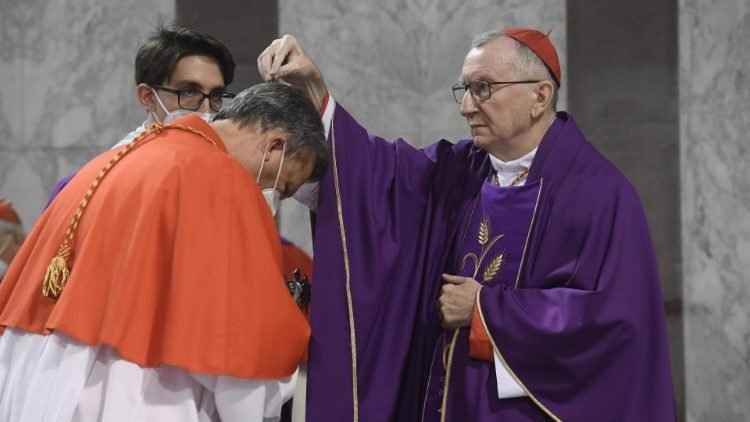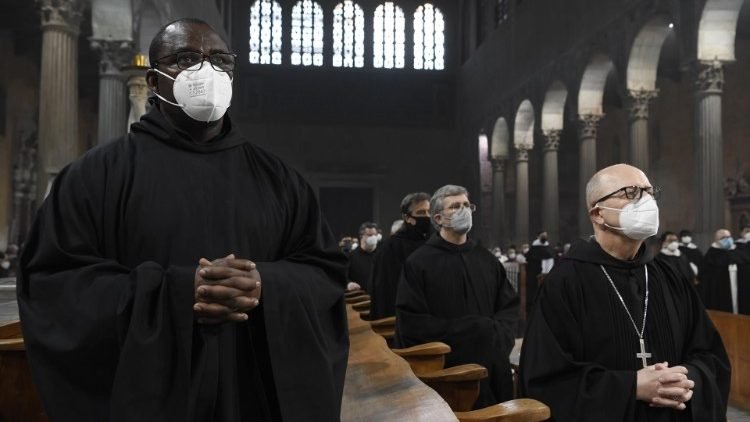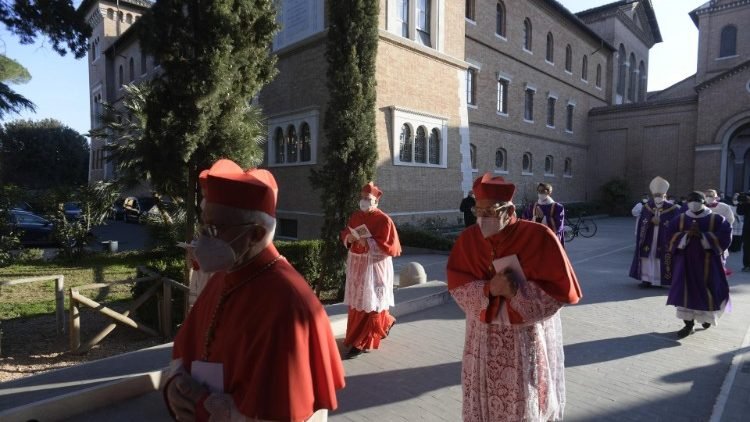Ash Wednesday: We implore the peace only God can give
Cardinal Pietro Parolin presides over the customary Mass on Ash Wednesday in Rome's Basilica of Santa Sabina in place of His Holiness Pope Francis, who is resting due to acute knee pain doctors are treating. The Cardinal read the Pope's homily, which recalled this day of prayer and fasting for Ukraine.
By Vatican News staff writer
Following an ancient Ash Wednesday tradition, Cardinal Pietro Parolin, Vatican Secretary of State began the “stational” liturgy at the Church of Sant’Anselmo before leading a penitential procession down the street to the Basilica of Santa Sabina on the Aventine Hill where he presided over Mass. His Holiness Pope Francis had been scheduled to preside, but as already announced last week, could not due to acute knee pain with doctors requesting he give his leg rest.
Ash Wednesday celebration at Rome's Basilica of Santa Sabina
March 2nd this year marks the beginning of Lent, the 40-day period of prayer, fasting, abstinence, and good works, in preparation for Christianity’s most solemn feast of Easter, which celebrates Jesus’s glorious resurrection following His passion and death on the Cross. The imposition of ashes on the forehead or head on Ash Wednesday is a Biblical symbol of repentance, reminding the faithful of man’s sinfulness before God and his mortality. The priest who imposes the ashes says, “Remember, Man is dust, and unto dust you shall return."
Ash Wednesday celebration at Rome's Basilica of Santa Sabina
Day of prayer and fasting for Ukraine
In his homily prepared for the occasion, which was read by Cardinal Parolin, Pope Francis underscored that prayer, charity, and fasting are "medicines" not only for ourselves but for all, and "they can change history" and are the "principal ways for God to intervene in our lives and in the world." And on this day of prayer and fasting for Ukraine, "we implore from God that peace which men and women are incapable of building by themselves." May the Lord hear these prayers, especially the lowly and suffering who are fleeing the violence, the Pope writes, and "restore peace to our heart; once again, grant your peace to our days."
Two kinds of reward
At the start of his homily, the Pope notes that, as heard in the Gospel at today's liturgy, we need to beware of practicing our piety in order to be seen and praised by others, when instead we should seek from the Father the "eternal, the true and ultimate reward, the purpose of our lives." The reward from others instead is "ephemeral" and is inward-looking, he notes, seeking out admiration for ourselves which is an illusion that leaves us unfulfilled.
Ash Wednesday procession from Church of Saint Anselm to the Basilica of Santa Sabina
Ashes as an austere sign
The rite of receiving ashes on our heads celebrated today, the Pope notes, protects us "from the error of putting the reward received from others ahead of the reward we receive from the Father," and marks an "austere sign," that helps us appreciate the transience of our human condition. It is like a bitter-tasting medicine, he added, "effective for curing the illness of appearances, a spiritual illness that enslaves us and makes us dependent on the admiration of others." Jesus warns us that "even prayer, charity, and fasting can become self-referential," the Pope points out, and we must strive to overcome our often hidden self-complacency, and unmask and recognize our own hypocrisies.
Purified by the Lenten ashes
The ashes can represent the "emptiness" behind our search for worldly rewards, the Pope writes, and "remind us that worldliness is like the dust that is carried away by a slight gust of wind." We would do well, he said, to make Lent a time to be "renewed, to nurture our interior life, and to journey towards Easter, towards the things that do not pass away, towards the reward we are to receive from the Father." Lent is a journey of healing that goes day-by-day with a "renewed spirit", he added, and prayer, charity, and fasting are part of the process…
This report was originally published on Vatican News website. Please click here to read the full text.



